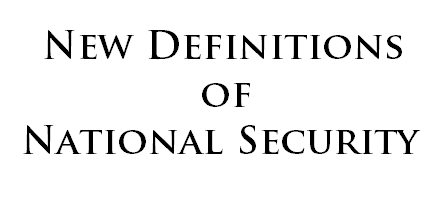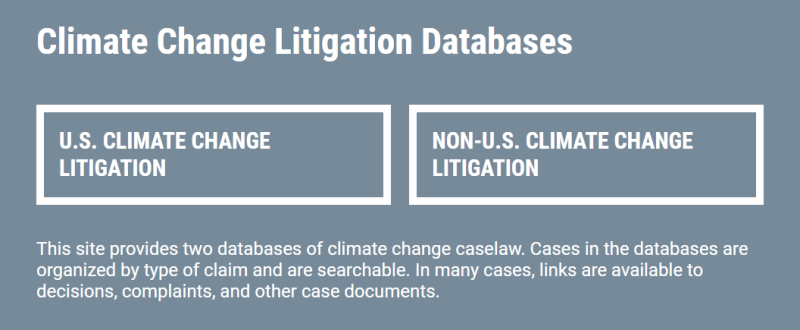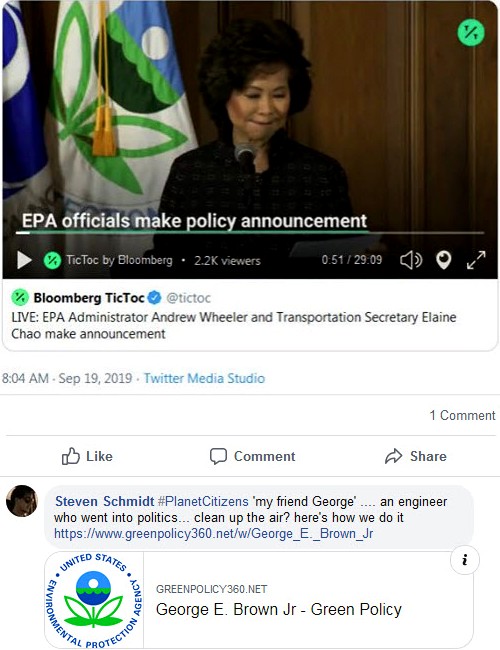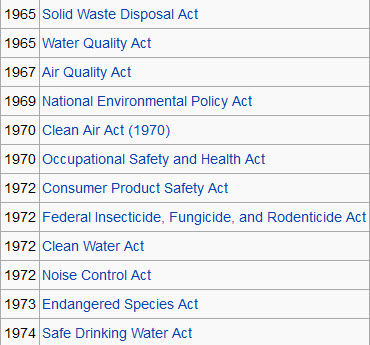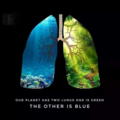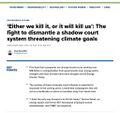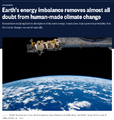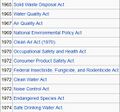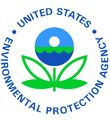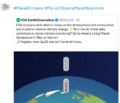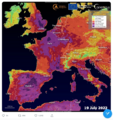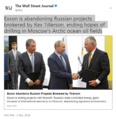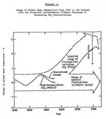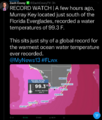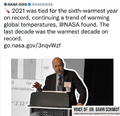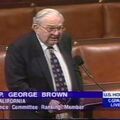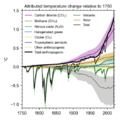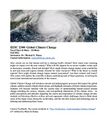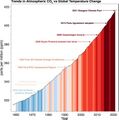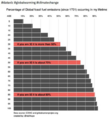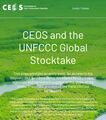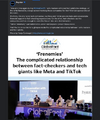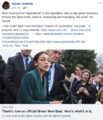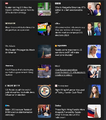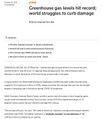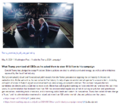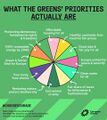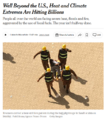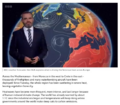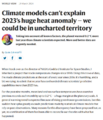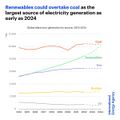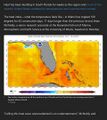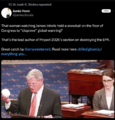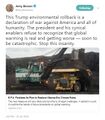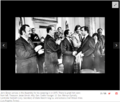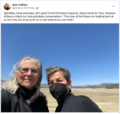Category:Environmental Laws
<addthis />
- New Vision for a Connected World
- National & Global Security, Indivisible
Read about the Trump Environmental Rollbacks
Decades of environmental protection devastated. Polluters celebrate. Oil/gas CO2 with fracking technology. Climate government action collapses.
Law & Environment, Protection & Retreat
The Future of International Environmental Governance
Experts have highlighted a clear legal challenge: international environment law is fragmented in many conventions and international declarations...
The Global Pact for the Environment will be the first international legally binding document, gathering and harmonizing all environmental laws in one single document. Its objective is to be an essential tool for governments to help them implementing environmental rules and principles in their own country.
Environmental Security & "Thin Blue"
New Definitions of National Security @StrategicDemands
·······································································
Environmental Law / United States
Trump administration rushes forwRd with its anti-environmental law and dismantling of community health, protection and planning'
2020 witnesses a presidential administration attemptint to dismantle 50 years of environmental protection laws
(CNN) Here's a list of many of the major environmental rollbacks the Trump administration has attempted to undertake.
Oil, natural gas, methane and power;Automobiles; Public lands; Water; Wildlife; Agriculture...
Read about the U.S. U-turn...
- ·····················································
Earth Science, Advances and Setbacks
The 2016 U.S. election was a 'turn-back-the-clock' election result. Environmental laws passed with success over decades are being dismissed under Trump attack and a short-sighted, 'short-termism'. Pushing an agenda that deconstructs achievements of a previous generation, a U.S. President is leaving a damaging legacy. Every week seems to bring the announcement of another set-back to a green, environmental platform.
We should consider again the beginning of the green era in the U.S. and successive accomplishments in law and practice that clearly deserve to be built upon, not to be dismantled by retro-policies.
95 Environmental Rules Being Rolled Back Under Trump
US Environmental Laws Rollback Tracker
One Environmental Law Rollback
"This will be the biggest loss of clean water protection the country has ever seen," said Blan Holman, an attorney with the Southern Environmental Law Center.
The new measure will roll back Obama-era "Waters of the United States" (WOTUS) regulations aimed at ensuring wetlands and streams are protected under the 1972 Clean Water Act, which the Trump Environmental Protection Agency has repeatedly targeted.
"This puts drinking water for millions of Americans at risk of contamination from unregulated pollution," said Holman. "This is not just undoing the Obama rule. This is stripping away protections that were put in place in the '70s and '80s that Americans have relied on for their health."
As the New York Times reported in January 2020, the Trump rule "will remove federal protections from more than half the nation's wetlands, and hundreds of thousands of small waterways."
"His administration had completed the first step of [the WOTUS regulation's] demise in September with the rule's repeal," the Times reported. "His replacement will complete the process, not only rolling back 2015 rules that guaranteed protections under the 1972 Clean Water Act to certain wetlands and streams that run intermittently or run temporarily underground, but also relieves landowners of the need to seek permits that the Environmental Protection Agency had considered on a case-by-case basis before the Obama rule."
Trump and EPA chief Andrew Wheeler, a former coal lobbyist, touted the rule at the American Farm Bureau Federation's annual convention in Texas.
·········
US acts to unravel environmental protections as president is impeached and another war is imminent
Trump administration attacks the 'Magna Carta' of US Environmental Protection, the NEPA Act
Administration officials say they aim to "modernize and clarify" the 50-year-old National Environmental Policy Act, NEPA.
National Environmental Policy Act
NEPA is often said to be the Magna Carta of the environmental movement...
·········
Continuing its deep cuts and rollbacks of environmental protections
Today Sept. 19, 2019, the Trump administration takes aim at clean air and auto mileage standards
Wife of Senator Mitch McConnell delivers the news
·········
Trump and Partisan Supporters Act to Dismantle
Decades of Constructive Work Set Side
Rep. George E. Brown and the generation who envisioned and created the first auto emission, clean air standards and foundational US state and national environmental standards are having their work set aside by the Trump administration...
Trump's Losing Record on Energy and the Environment
Trump's Lack of Vision
Pushing Fossil Fuels, Emissions and Consequences
○
Local Clean Water News / Politics
Fox News US ridicules local efforts to cut back on single-use plastic un-recycled household items
As US Clean Water Act Is Undercut by Fox-supported US president, a first study of 'Tampa Bay Plastic Pollution' reveals '4 Billion Microplastic Particles'
·········
The modern environmental movement
Environmental protection to build on
○
Environmental Law / Global / International
Californian and US models of environmental legislation go international
List of International Environmental Agreements
○
Montreal Protocol, the beginning of international environmental law
* https://en.wikipedia.org/wiki/Montreal_Protocol
Due to its widespread adoption and implementation it has been hailed as an example of exceptional international co-operation, with Kofi Annan quoted as saying that "perhaps the single most successful international agreement to date has been the Montreal Protocol" ... When comparing this very success story with attempts to establish an international policy on the Earth's climate or atomic energy, the entire process from a problem formulation to a global acceptance supported by a legal framework took less than a quarter of a single human generation live span.
Among the treaty's accomplishments are: The Montreal Protocol was the first international treaty to address a global environmental regulatory challenge; the first to embrace the "precautionary principle" in its design for science-based policymaking; the first treaty where independent experts on atmospheric science, environmental impacts, chemical technology, and economics, reported directly to Parties, without edit or censorship, functioning under norms of professionalism, peer review, and respect; the first to provide for national differences in responsibility and financial capacity to respond by establishing a multilateral fund for technology transfer; the first MEA with stringent reporting, trade, and binding chemical phase-out obligations for both developed and developing countries; and, the first treaty with a financial mechanism managed democratically by an Executive Board with equal representation by developed and developing countries.
····························································
····························································
The New Environmental Regulation
MIT Press: Environmental regulation in the United States has succeeded, to a certain extent, in solving the problems it was designed to address; air, water, and land, are indisputably cleaner and in better condition than they would be without the environmental controls put in place since 1970. But Daniel Fiorino argues in The New Environmental Regulation that—given recent environmental, economic, and social changes—it is time for a new, more effective model of environmental problem solving. Fiorino provides a comprehensive but concise overview of U.S. environmental regulation—its history, its rationale, and its application-—and offers recommendations for a more collaborative, flexible, and performance-based alternative.
“This is one of the most important books on U.S. environmental policy to appear in the past twenty years. Fiorino offers a convincing analysis of its strengths and weaknesses and points the way towards a new style of regulation appropriate to the challenges of the twenty-first century.”
○
Legal Issues Confronting Environmental Protection Laws
- Selected Issues
Investor-State Dispute Settlement / ISDS
Investor-state dispute settlement (ISDS) is an instrument of public international law, that grants an investor the right to use dispute settlement proceedings against a foreign government. Provisions for ISDS are contained in a number of bilateral investment treaties, in certain international trade treaties, such as the North American Free Trade Agreement (Chapter 11) and the Trans-Pacific Partnership (Chapters 9 and 28). ISDS is also found in international investment agreements, such as the Energy Charter Treaty. If an investor from one country (the "Home State") invests in another country (the "Host State"), both of which have agreed to ISDS, and the Host State violates the rights granted to the investor under public international law, then that investor may bring the matter before an arbitral tribunal. So, for example, if after an investor has acquired the right to sell cigarettes in a Host State, the Home State imposes a heavy tax on cigarettes (because they are carcinogenic), then the investor sue for his losses: This is a great protection for corporate investment, and a recognition of the primacy of corporate profits.
"If you wanted to convince the public that international trade agreements are a way to let multinational companies get rich at the expense of ordinary people, this is what you would do: give foreign firms a special right to apply to a secretive tribunal of highly paid corporate lawyers for compensation whenever a government passes a law to, say, discourage smoking, protect the environment or prevent a nuclear catastrophe. Yet that is precisely what thousands of trade and investment treaties over the past half century have done, through a process known as 'investor-state dispute settlement', or ISDS."
Note: In early January 2016, the TransCanada corporation announced it would initiate an ISDS claim under NAFTA against the United States, seeking $15 billion in damages and calling the denial of a permit for Keystone XL "arbitrary and unjustified."
Read More:
(SJS: The legal provisions and politics of many trade agreements act to undercut and 'water down' environmental laws. The on-the-ground reality of many provisions within existing trade agreements that act against environmental law protections remain one of the foremost challenges for greens and the environmental movement. One necessity among many is to point out the problems with secret administrative rulings of trade treaties, the "ISDS" sections in the treaties, and reform/rewrite these sections to enable worker/environmental protections across economic systems and national borders. This is a "blue-green", labor-environment alliance, that needs to be continually developed for steady progress, locally and globally.)
○
General Agreement on Tariffs (see 'Uruguay Round') - GATT
International Centre for Settlement of Investment Disputes
International Investment Agreement - https://en.m.wikipedia.org/wiki/International_investment_agreement
North American Free Trade Agreement (NAFTA) - https://en.m.wikipedia.org/wiki/North_American_Free_Trade_Agreement
Tran-Pacific Partnership (TPP) - https://en.m.wikipedia.org/wiki/International_investment_agreement
Transatlantic Trade and Investment Partnership (TTIP) - https://en.m.wikipedia.org/wiki/Transatlantic_Trade_and_Investment_Partnership
United Nations Commission on International Trade Law
World Trade Organization - https://www.wto.org/
____________________________________________
Personal Recollections
Siterunner / SJS: Reflecting about the 1992 US presidential campaign when I served in a number of roles as a Sr advisor to Jerry Brown.
One memory comes into view as the subject of environmental laws is discussed here at GreenPolicy. This is the NAFTA controversy, the treaty that was being debated between our campaign and the Clinton campaign. We opposed the treaty as it was negotiated, the Clinton campaign and much of the 'new' Democratic party as reflected in the Democratic Leadership Council (DLC) supported it.
In the presidential debates at one point I was preparing briefing materials for Governor Brown and we were focusing on what we called the 'watering down' of worker and environmental law protections. We saw our US environmental law successes in the 60s, 70s and into the 80s, as a 25 year slate as a foundation of environmental protection laws. Many had originated in California and in Congress with California representatives) and these legal, env regulations had been hard won over the years. We aspired for them to become models for other states and countries, a framework for international progress. The treaties, however, were sliding in another way. What we were saying is that, with the passage of these treaties as written, there would be 'a race to the bottom' and trade treaties like NAFTA and GATT were costly in ways that would set back progress on multiple fronts, from jobs to environmental protection and security. Why? We began by pointing out provisions that allowed 'secret tribunals' to arbitrate and decide on disputes over 'non-tariff trade barriers', i.e, worker and environmental protection laws.
Our position resonated and we found support, but as we did we also found that there would be another anti-NAFTA candidates, one with many charts and quotable lines. The history of the 1992 campaign illustrated how the Perot campaign (which eventually received 19% of the general election vote and was instrumental in the election of Bill Clinton, who received 43% of the vote) took up the Brown campaign motto and some themes, including opposition to the NAFTA agreement, but Perot did not focus on the extra-administrative authority contained in Investor-state dispute mechanisms and so-called non-tariff trade barriers as applied to a host of environmental laws. The Brown campaign criticism on this front were prescient, as history continues to demonstrate. Our criticisms helped to produce additional negotiations, yet secret administrative tribunals for dispute resolution continue on.
The recent action by a Canadian corporation to sue the US for $15 billion in 'damages' over the US rejection of the XL gas pipeline based upon study and evidence of environmental and climate damage, is just one example of multiple instances where secretive tribunals are a front- and back-end threat to progress on worker and environmental laws.
The benefits to 'the commons', whether local, national, or global as in the case of climate policy, is essential for shared global and national security.
A strong, lasting architecture of environmental laws is essential. Trade agreements must protect not act to dismantle environmental security.
The TransCanada lawsuit highlights the environmental issues with secret tribunals and current trade treaty provisions
January 2016
DemocracyNow interview with Lori Wallach, director of Public Citizen's Global Trade Watch, the author of "The Rise and Fall of Fast Track Trade Authority"
LORI WALLACH: Well, what it boils down to is a foreign corporation deciding that the US taxpayers ought to give them $15 billion because they don't like the outcome of our government decision that this pipeline was bad for our country and bad for the environment. And where they're going to get this money extracted from us is an extrajudicial - not US court, not US law - forum: the investor-state tribunal allowed under NAFTA. And the US has faced about a dozen of these attacks under NAFTA, all from Canada, but we have 50 agreements that have this outrageous system. Hardly any of those countries with those agreements actually have investors here. So, up to now, we haven't lost one of these cases; however, the Trans-Pacific Partnership, overnight, if implemented, would double our liability. Right now, 50 agreements, about 9,000 companies are cross-registered from one of those countries that we have the agreement with operating in the US to attack our laws in these tribunals. Overnight, the TPP would give 9,500 more companies - big multinationals from Japan, in banking, in manufacturing, mining firms from Australia - the right to do this. So this case, hopefully, is like the canary in the coal mine letting us know what we'd be getting into.
AMY GOODMAN: In May, President Obama delivered a speech at Nike in Beaverton, Oregon, where he defended the pending Trans-Pacific Partnership trade deal.
- PRESIDENT BARACK OBAMA: Critics warn that parts of this deal would undermine American regulation, food safety, worker safety, even financial regulations. This - they're making this stuff up. This is just not true. No trade agreement is going to force us to change our laws.
AMY GOODMAN: President Obama also said the TPP improves on NAFTA.
- PRESIDENT BARACK OBAMA: When you ask folks, specifically, "What do you oppose about this trade deal?" they just say, "NAFTA." NAFTA was passed 20 years ago. That was a different agreement. And in fact, this agreement fixes some of what was wrong with NAFTA by making labor and environmental provisions actually enforceable. I was just getting out of law school when NAFTA got passed.
AMY GOODMAN: Lori Wallach, your response to President Obama? He was speaking at Nike headquarters.
LORI WALLACH: Well, first of all, the making stuff up comment is going to have to get shelved, because not only is this attack by TransCanada on our domestic, democratic government decision not to have a pipeline the exact kind of case he said couldn't possibly happen - well, it just did, $15 billion being demanded by a - from a tribunal of three private sector attorneys, because this investor-state system, it's not judges. There are no conflict-of-interest or impartiality rules. These are folks who rotate between one day suing a government for a corporation and the next day being the judge. And they all hear cases amongst themselves. They call themselves "the club." And there's no outside appeal, and there's no limit on how much money they can order a government to pay. And if a government doesn't pay, by the way, the company has the right to seize government assets - seize government assets - to extract our tax dollars. So, number one, this case is exactly the kind of case President Obama said folks were making things up when they were worried about this. Well, now it's happened.
But this follows one month after the US Congress, because the WTO threatened billions in trade sanctions, gutted another consumer law. Hate to tell folks, if they didn't notice in the grocery store, but those customer meat - the country-of-origin labels we all use to figure out where our meat comes from, the WTO said we couldn't have those anymore. And so, Congress, at the face of these sanctions, said, "Oh, better get rid of that law." So, two examples, live and real, compared to what President Obama promised.
But more broadly about the TPP, here's the thing folks need to know. The actual language that TransCanada is using in this case, because they filed a brief, is the same language that, word for word, is replicated in TPP. So there are bells and whistles that have been changed between the investor-state language in NAFTA and TPP. In many ways, actually, TPP expands investor-state. It allows more kinds of challenges. Hell, it even allows challenges of government contracts for foreign companies' concessions on natural resources in foreign land. That was not in NAFTA. However, the actual claims being made by TransCanada, that language is word for word in the TPP. And you can see the analysis of that on our website, TradeWatch.org. You can look at the text now and use our analysis as basically a guided tour.
AMY GOODMAN: Lori, can you explain why they're asking $15 billion?
LORI WALLACH: So, this is a question a lot of folks asked me yesterday: "Well, wait a minute, this is supposed to" - everyone who's read the newspaper. "This is a $3 billion pipeline. How the heck can they be asking for $15 billion from us taxpayers?" And the answer is, under the outrageous investor-state system, not only can a foreign corporation get all these special rights - go around our courts, go around our laws and demand compensation - but they don't just get money for what they've spent on a project, they get to get compensated for expected future profits. Yep, they are calculating - and the brief goes through this - what they think they would have made in the future for the lifetime of the pipeline had it been allowed. And that's what we taxpayers are supposed to give them, because we had a democratic decision of our government that their commercial project wasn't in the national interest. That's the $15 billion.
AMY GOODMAN: Can you talk about how trade rules have affected how countries can deal with climate change? Like in, what, 2014, the US launched a WTO challenge against India's solar incentives.
LORI WALLACH: So, there's been really terrific work done on this by Sierra Club, NRDC, 350.org. If you go to their websites, for instance, Sierra Club has a terrific report that goes systematically through all the ways that our trade rules have undermined the efforts both to counter climate chaos, but also some of the adaptations, the efficiencies in energy policy we'd like to take on. And the overarching sum of it is, there are three problems.
One problem is, once we have a trade agreement with a country, we're no longer allowed to stop exports of, for instance, liquid natural gas. It's just deemed mandatory that we continue to send out energy. So, to the extent part of the answer to the climate disaster is we need to keep some carbon-based fuels not being processed and shipped around, we lose the right, as a policy, to do that. It's considered zero quota. We're not allowed to limit trade.
Number two, the nontrade regulatory limits in all these trade agreements - because, you know, the rule is, every country has to change its domestic laws to meet all these nontrade rules. TPP has got 30 chapters. Only six have to do with trade. There's a whole chapter on services, and it covers energy services. For instance, it does not allow you, in your policies, to discriminate between how you regulate, say, fossil fuels versus wind or solar. If it's fuel, it's fuel. And there's a whole set of specific constraints around those kind of energy and conservation policies.
And then, the third thing it does is it limits the kind of procurement policies you can have. So, typically, the government is the cutting edge in using our tax dollars when they're buying things for government to set up a market. So, you know, the car efficiency standards, fuel efficiency standards, we all know there's CAFE standards in our cars when we buy them. That started as a government program for the government fleet, so that the companies had a market to try and make efficient cars. So, right now, for instance, we have something called renewable portfolio standards, where when the government buys energy, a certain percentage has to be from renewable sources. Those kind of conditionalities are limited in the procurement chapter of an agreement like the TPP. So, basically, it hits, for the fuel industry - that's why they love it - on all grounds, in handcuffing governments with their policy options.
○
Environmental Laws
Green Best Practices -- Legislation
Models for Protecting and Preserving
Environmental Regs (U.S.)
Climate Litigation
○
Subcategories
This category has the following 34 subcategories, out of 34 total.
Pages in category "Environmental Laws"
The following 114 pages are in this category, out of 114 total.
B
C
- California Global Warming Solutions Act
- Campaign Finance System Reform
- Carbon Brief
- Climate Change - Global Warming Keyword-Terms
- Climate Change Denier Talking Points -- and Rebuttals
- Climate Change Summit Paris
- Climate Desk
- Climate Law Blog @Columbia Law School
- Climate migration
- Climate News
- Climate News Events Archive ... 1970 to Today
- Climate Plans Enforcement - Resources
- Climate Problems, Climate Solutions
- Convention on the International Trade in Endangered Species of Wild Flora and Fauna
E
- Each of us can make a positive difference
- Earth and Space, Politics
- Earth Day 2020
- Earth Day Memories on the 50th Anniversary
- Earth Day Summit - April 22 2021
- Earthrise
- EarthTime
- Eco-economic Decoupling
- Eco-nomics
- Election System Reform
- Environmental agreements
- Environmental Law, Rollbacks under Trump 2016-20
- Environmental movement
- Environmental protection
- Environmental Protection Agency
- Environmental Rules Rolled Back
- Environmental Studies Online
- EOS eco Operating System
- ESA Living Planet Announcement - May 2022
- Ethics and Climate Change
- European Union Green Deal - Fit for 55
- ExxonMobil and US House Science Committee v US Attorneys General and Environmental Groups
G
- Generation Green
- George E. Brown Jr
- Glasgow Climate Summit - Pledges, Promises, Declarations - What's Next Up
- Global Climate Action Summit
- Going Green
- Going Green: Texas v. Pennsylvania
- Google Earth
- Google Earth Timelapse
- Governor Jerry Brown
- Green Bank in Maryland - and More
- Green Best Practices
- Green Education
- Green Party
- Green Policy domains
- Green Politics 360
- Green Politics with GreenPolicy360
- Green Stories of the Day
- Green Stories of the Day - GreenPolicy360 Archive
- GreenAction
- Greening Our Blue Planet
- GreenLinks
- GreenPolicy360 Archive Highlights 2013
- GreenPolicy360 Archive Highlights 2014
- GreenPolicy360 Archive Highlights 2015
- GreenPolicy360 Archive Highlights 2016
- GreenPolicy360 Archive Highlights 2017
- GreenPolicy360 Archive Highlights 2018
- GreenPolicy360 Archive Highlights 2019
- GreenPolicy360 Archive Highlights 2020
- GreenPolicy360 Archive Highlights 2023
- GreenPolicy360 Highlights
- GTN GreenLinks Trending News
I
O
P
R
Media in category "Environmental Laws"
The following 200 files are in this category, out of 754 total.
(previous page) (next page)- Earths two lungs.png 336 × 336; 130 KB
- EarthScience Missions via the EOS - 2022.png 800 × 219; 139 KB
- Economist.com global capital snapshot as of July 2020.jpg 800 × 477; 119 KB
- EDF satellite - methane tracking.png 600 × 674; 388 KB
- Eiffel tower green.jpg 759 × 422; 28 KB
- EleanorRooseveltHumanRights.png 535 × 423; 60 KB
- Elon Musk quote - gas externality price.png 680 × 320; 199 KB
- Emissions graph - gleick tw 2018.jpg 640 × 364; 37 KB
- End of coal power in UK - 1.jpg 800 × 868; 112 KB
- End of coal power in UK - 2.png 800 × 557; 225 KB
- End of coal power in UK - 3.png 800 × 562; 240 KB
- End of Coal Power in UK.png 800 × 925; 739 KB
- Energy Charter Treaty.jpg 512 × 480; 74 KB
- Energy Imbalance, Climate Change - Aug 1 2021.png 640 × 672; 394 KB
- Env policy laws US 'the beginning' of env era.jpg 370 × 345; 65 KB
- Envir earth day 1970.jpg 197 × 295; 13 KB
- Environmental Justice and Environmental Law.jpg 274 × 668; 108 KB
- Environmental laws in US - Supreme Court votes soon.png 800 × 414; 334 KB
- Environmental Protection Agency logo.png 380 × 414; 39 KB
- Environmental Studies-Documerica.png 688 × 963; 522 KB
- EOS starliner gr2.png 320 × 91; 3 KB
- EPA History Xin Liu-2010.pdf ; 2.88 MB
- EPA website - Climate Change priority - March 2021.jpg 786 × 600; 140 KB
- EPA website a 'ghost page' now.png 667 × 233; 45 KB
- ESA Living Planet Symposium - Announcement.png 637 × 600; 508 KB
- ESA Living Planet Symposium - May 2022.png 700 × 600; 258 KB
- ESG Fight - Feb 2023.png 396 × 194; 88 KB
- Estuary in Clearwater on Tampa Bay.jpg 3,584 × 2,016; 1.5 MB
- EU agrees to cut emissions 55 percent by 2030.jpg 800 × 558; 96 KB
- EU unveils new climate change policy - July 14 2021 - 1.jpg 800 × 234; 33 KB
- EU unveils new climate change policy - July 14 2021 - 2.jpg 800 × 552; 86 KB
- EU unveils new climate change policy - July 14 2021 - 3.jpg 800 × 549; 89 KB
- EU unveils new climate change policy - July 14 2021 - 4.jpg 800 × 550; 92 KB
- EU unveils new climate change policy - July 14 2021 - 5.jpg 800 × 548; 88 KB
- EU unveils new climate change policy - July 14 2021 - 6.jpg 800 × 557; 89 KB
- EU unveils new climate change policy - July 14 2021 - 7.jpg 800 × 553; 92 KB
- EU unveils new climate change policy - July 14 2021 - 8.jpg 800 × 589; 91 KB
- Europe heat wave - July 19 2022 - via Copernicus satellite.png 600 × 639; 704 KB
- European Greens - Baerbock - Candidate for German Chancellorship.jpg 513 × 185; 37 KB
- European Greens EGPCongress Dec 2022.png 800 × 745; 640 KB
- Evolution of Human Energy Use - 1800-2020.png 800 × 450; 199 KB
- Extreme temperature-world-May 2024.jpg 640 × 427; 105 KB
- Exxon-Russia abandon oil drilling in Arctic-March 1, 2018.png 600 × 618; 264 KB
- ExxonMobil CO2 climatic response study - Graphic 1 - 1982.png 537 × 680; 150 KB
- ExxonMobil CO2 climatic response study - Graphic 2 - 1982.png 537 × 605; 112 KB
- Eyes On Global Security Threats - via Strategic Demands April 2022.png 600 × 776; 308 KB
- Fact Checking @GreenPolicy360.jpg 580 × 800; 206 KB
- Fact Checking organizations at work.jpg 800 × 390; 44 KB
- Facts about US Energy Use.jpg 697 × 600; 101 KB
- Facts Count-WaPo Reports-19127 false-misleading claims in 1226 days.jpg 601 × 489; 100 KB
- FairVote.jpg 535 × 122; 14 KB
- Fallows re Brown speech to the AGU Dec2016.png 533 × 354; 65 KB
- Feeling the Heat 1989.png 800 × 1,095; 400 KB
- Floating adaptations - GCA - for sea-level rise - circa 2023.png 600 × 732; 273 KB
- Florida 2024 Heating up and upset.jpg 460 × 581; 89 KB
- Florida governor and legislature strike climate science - 2024.png 640 × 105; 42 KB
- Florida Keys sea surface temps for 2023 (as of July).png 480 × 585; 287 KB
- Florida ocean water temp south of Everglades tops 99 F. degrees.png 480 × 564; 128 KB
- Florida rights of nature lawsuit - May 2021.jpg 527 × 806; 179 KB
- Florida sea surface water in the Keys area tops 100 degree F.jpg 640 × 257; 58 KB
- Foley on March29,2017.png 487 × 135; 0 bytes
- From 1968 to 1992 -- and the Journey continues....png 572 × 851; 320 KB
- G7 Climate News.png 640 × 205; 125 KB
- G7 DJTclimatetweet.png 640 × 300; 45 KB
- G7 Split-2017.png 800 × 182; 177 KB
- G7-Climate-2017.png 800 × 136; 66 KB
- G7-Climate-News.png 640 × 317; 176 KB
- Gavin Schmidt - NASA - January 2022.png 451 × 436; 150 KB
- GCAS original.png 800 × 504; 94 KB
- GCAS-2.jpg 800 × 450; 136 KB
- George Brown 1969-Reflections on US Role in the World.png 700 × 372; 99 KB
- George Brown, Sci Com't.jpg 200 × 200; 7 KB
- George.jpg 380 × 313; 16 KB
- German foreign minister travels to India.png 640 × 178; 115 KB
- GHG emissions 1970-2010.jpg 800 × 438; 50 KB
- GHG forcings 1750-2020.png 531 × 531; 94 KB
- GHG ppt concentrations 1975-2020.jpg 640 × 361; 69 KB
- Ginsburg leaves a chasm on the Supreme Court.jpg 800 × 624; 92 KB
- Gistemp 1979-2019.png 750 × 491; 335 KB
- Glasgow-Climate Conference News-Nov 6, 2021.png 600 × 800; 290 KB
- Global Changes in temperature 1850-2020.jpg 480 × 480; 152 KB
- Global Climate Change textbook-Edition2.jpg 604 × 680; 96 KB
- Global climate conferences and GHG increases.jpg 793 × 801; 56 KB
- Global Climate Dashboard - NOAA - Climate.gov.png 630 × 480; 165 KB
- Global climate dashboard-NOAA climate.gov.jpg 521 × 221; 45 KB
- Global climate dashboard-www.climate.gov.jpg 800 × 489; 100 KB
- Global Climate Dashboard.jpg 800 × 529; 101 KB
- Global Climate Strike - RU.jpg 450 × 804; 116 KB
- Global fossil fuel emissions - in a lifetime graphic.png 600 × 657; 233 KB
- Global greenhouse gas emissions - 1980 - 2020.png 640 × 480; 158 KB
- Global Primary Energy Consumption - 1800-2017.jpg 800 × 583; 65 KB
- Global sea surface temperature 1982-2024.png 800 × 823; 566 KB
- Global sea surface temperature graph as of 2024.png 800 × 455; 654 KB
- Global Stocktake, the first GST.jpg 800 × 905; 513 KB
- Global temperature change 1850-2016.gif 512 × 288; 1.38 MB
- Global temperature change 1901-2000.jpg 640 × 508; 47 KB
- Global temperature variations over past 200 years.jpg 640 × 360; 29 KB
- Global warming June 2024.jpg 640 × 174; 46 KB
- GlobalClimateStrike-March15,2019.jpg 600 × 613; 30 KB
- GlobalFact conf - 2024.png 600 × 719; 347 KB
- GND next steps.png 567 × 660; 304 KB
- Good science needs good data .png 579 × 420; 223 KB
- Google Earth Engine.png 448 × 165; 45 KB
- Gov Brown not turning back, not now, not ever.png 581 × 428; 207 KB
- GP360 tagcloud2 m.png 531 × 324; 132 KB
- GP360 tagcloud2.png 655 × 400; 184 KB
- Green Branching Out.jpg 400 × 194; 35 KB
- Green Networking @GreenPolicy360.net.png 788 × 604; 764 KB
- Green New Deal, work in progress.jpg 800 × 450; 62 KB
- Green Something to Think About.png 480 × 480; 200 KB
- Green Wave.png 613 × 405; 427 KB
- Greeneuropeanjournal.eu.jpg 485 × 237; 30 KB
- Greenhouse gas levels hit record - Reuters.jpg 600 × 696; 104 KB
- GreenPolicy360 - May- 9-2024.png 800 × 406; 119 KB
- GreenPolicy360 - May-10-2024.png 790 × 694; 320 KB
- Greens EU 2024.jpg 480 × 540; 91 KB
- Greta - the politics thats needed.jpg 639 × 203; 38 KB
- Greta anger into action.png 800 × 419; 528 KB
- Greta Looks Back.PNG 504 × 437; 368 KB
- Greta outside the Swedish Parliament, August 2018.jpg 680 × 398; 78 KB
- Greta Thunberg - Week 203 Climate Strike Banner.png 209 × 127; 51 KB
- Greta Thunberg - Week 203 Climate Strike.png 554 × 601; 488 KB
- Greta Thunberg speaks to EU - Apr16,2019.jpg 720 × 418; 32 KB
- Gulf Stream in Critical Danger.pdf ; 181 KB
- Hansen testimony WaPo front page.jpg 480 × 210; 40 KB
- Heat hitting billions.png 614 × 690; 509 KB
- Heat stress in US may double by end of century.jpg 640 × 503; 107 KB
- Heat Wave Asia - April May 2022.png 766 × 132; 25 KB
- High Seas Treaty agreement - March 4 2023.png 617 × 498; 53 KB
- Hindu Kush-Himalayas - 2023 Report on Dangerous Climate Impacts.png 800 × 819; 1,023 KB
- Historic climate-clean energy vote in US Congress August 12 2022.jpeg 800 × 775; 384 KB
- Historic gulf of mexico warm water.png 800 × 306; 148 KB
- Historic heat in gulf of mexico.png 800 × 810; 590 KB
- Historic photographs - Humble Oil TX - Exxon.png 591 × 596; 548 KB
- History of drought in the US Southwest.png 800 × 324; 386 KB
- Hot weather and climate change ... in Houston.png 413 × 154; 16 KB
- Hotimes.png 514 × 481; 201 KB
- Hottest decade on record.jpg 776 × 490; 69 KB
- Hourglass-sand-2.jpg 450 × 342; 12 KB
- House passes biggest climate investment in U.S. history.png 625 × 480; 114 KB
- How Earth Survived - Time Magazine - Sept 2019.jpg 644 × 858; 193 KB
- How to Fact Check.png 600 × 766; 384 KB
- Huge heat anomaly in 2023 - by Gavin Schmidt.png 735 × 857; 172 KB
- Human history, as an 800 page book.jpg 799 × 1,112; 148 KB
- Hurricane-Proofing-Home-2024-Miami-Florida.png 658 × 600; 652 KB
- I Am Greta - the Documentary.jpg 387 × 485; 30 KB
- I Am Greta Marching.jpg 800 × 534; 80 KB
- I dont believe it.png 675 × 315; 50 KB
- I've done all I can.png 584 × 101; 19 KB
- IEA - Support for Fossil Fuels - re 2021.jpg 559 × 800; 143 KB
- IEA energy chart - 2023.jpg 600 × 600; 68 KB
- IEA News 1.jpg 480 × 400; 64 KB
- IEA News 2.jpg 480 × 475; 55 KB
- IEA News 3.jpg 480 × 496; 57 KB
- IEA News 4.jpg 480 × 530; 57 KB
- IEA News 5.jpg 480 × 539; 62 KB
- IFCN Code of Principles.jpg 749 × 766; 155 KB
- In Love with Earth.jpg 328 × 499; 15 KB
- Infoamazonia-fires-Aug2019.jpg 800 × 663; 124 KB
- Infrastructure Bill and Climate Resilience - A Step Forward.png 640 × 403; 526 KB
- International Fact Checking Network - 2021 TW.jpg 600 × 755; 99 KB
- Intertidal Zone.png 800 × 474; 489 KB
- IPCC Report - Feb 2022.jpg 448 × 291; 113 KB
- IPCC report August 9-2021 (1).jpg 745 × 380; 156 KB
- IPCC report August 9-2021 (2).jpg 745 × 428; 171 KB
- It's hot in South Florida - July 2023.jpg 480 × 537; 92 KB
- It's Hot the Times UK Says... Act Now or else - July 2022.png 800 × 416; 568 KB
- James Hansen 2024.jpg 600 × 658; 110 KB
- James Inhofe -- and Project 2025.png 640 × 670; 566 KB
- Jane Goodall.png 699 × 642; 443 KB
- January-May 2020 temp anomaly.jpg 680 × 380; 54 KB
- JasonHickel.org.jpg 640 × 351; 36 KB
- Jerry 2013.jpg 452 × 315; 20 KB
- Jerry Brown - Disrupter - film pre-release.jpg 640 × 367; 32 KB
- Jerry Brown 92 Presidential Platform We the People-Back Outside-Cover.jpg 416 × 568; 0 bytes
- Jerry Brown 92 Presidential Platform We the People.jpg 448 × 586; 40 KB
- Jerry Brown AGU-Dec14,2016.png 476 × 344; 117 KB
- Jerry Brown at the Democratic Party Platform hearings-1992.png 715 × 1,024; 773 KB
- Jerry Brown at UN 2017.jpg 768 × 512; 31 KB
- Jerry Brown documentary film-poster 2022.jpg 572 × 800; 113 KB
- Jerry Brown legacy in action.jpg 770 × 433; 49 KB
- Jerry Brown Meet the Press Dec 30 2018.png 799 × 460; 868 KB
- Jerry Brown on Twitter - March 2018.png 555 × 278; 25 KB
- Jerry Brown re EPA - 19 June 2019.jpg 699 × 798; 126 KB
- Jerry Brown, photo courtesy of LA Times, Apr 2018.jpg 640 × 360; 30 KB
- Jerry Brown, swearing-in as Governor 1975.png 640 × 542; 241 KB
- Jerry Brown-Climate Week, NYC, Sept2018.jpg 800 × 534; 242 KB
- Jerry Brown-Global Climate Action Summit.png 800 × 453; 900 KB
- Jerry w Steve '92 pres campaign at the Dem plat hearing m.jpg 416 × 492; 44 KB
- Jerry-Brown-quote.jpg 800 × 552; 69 KB
- Joan and Christiana - April 2022.png 486 × 460; 282 KB
- Joe Biden is projected winner Nov7-2020.jpg 343 × 120; 26 KB
- John Kerry - Climate Envoy - 2021-09-26.png 640 × 410; 349 KB
- Air Pollution
- Light Pollution
- Noise Pollution
- Plastic Pollution
- Pollution
- Radioactive Pollution
- Soil Pollution
- Thermal Pollution
- Toxics and Pollution
- Visual Pollution
- Water Pollution
- Legislation
- Topic
- Ballot Access
- Ballot Initiatives
- Ballot Measures
- Campaign Finance
- Civil Rights
- Climate Policy
- Corporate Accountability
- Election Law
- Election System Reform
- Electoral System Reform
- EOS eco Operating System
- Environmental Protection
- Environmental Security
- Global Security
- Green Politics
- Green Values
- Human Rights
- Initiative and Referendum
- Initiatives
- Money in Politics
- New Definitions of National Security
- Participatory Governance
- Peace
- Planet Citizen
- Redistricting
- Strategic Demands
- Sustainability Policies
- United States
- US
- Voting
- Voting Rights
- Voting Systems
- Workers Rights

